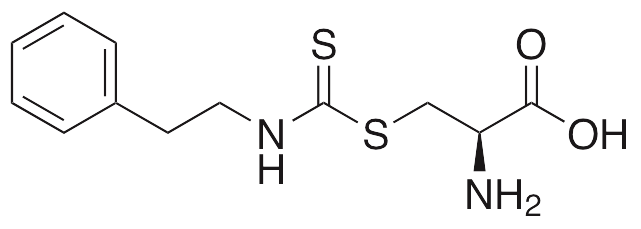Description
S-(N-Phenethylthiocarbamoyl)-L-cysteine is a conjugate of a phenethylisothiocyanate (PEITC) compound and cysteine. Isothiocyanates are typically found in plants of the Brassicaceae family, including broccoli, cabbage, and radish. Isothiocyanates are best known for their antioxidative, anticancer chemotherapeutic, chemopreventive, anti-angiogenic, and antibiotic properties. In vitro, PEITC increases caspase 3 activity and cleavage of poly(ADP)-ribose polymerase (PARP), inducing caspase-mediated apoptosis in Jurkat T cells and other cellular models. PEITC increases activation of JNK1, one potential mechanism behind its regulation of phase II detoxifying enzyme gene expression. Additionally, PEITC decreases levels of Bcl-xl and increases levels of Bax, also decreasing the mitochondrial membrane potential and inducing intracellular influx of free Ca2+, resulting in cell death. This compound decreases oxidation of carcinogen NNK and increases activity of NADPH:quinone oxidoreductase and glutathione-S-transferase in vitro and in vivo. In glioma cells, PEITC alters PI3K/MAPK signaling to inhibit accumulation of HIF-1α and secretion of VEGF during hypoxia.
